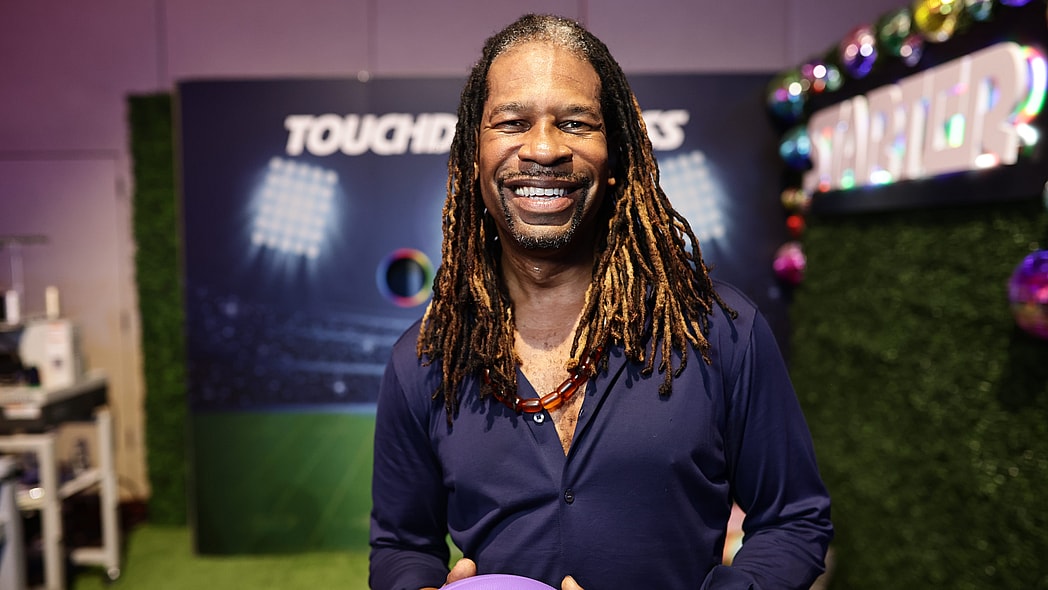After years of concealing his diagnosis, journalist LZ Granderson is ready to share his experience living with HIV. In an interview with “Good Morning America,” the openly gay sports reporter, writer and podcaster said he hopes to help break the stigma around the disease by publicly sharing his diagnosis.
“I am HIV positive and have been for a long time,” Granderson told GMA.
During a trip to Grand Rapids, Michigan, with his partner, Granderson recalled, he suddenly felt “a wave of heat,” causing him to sweat and eventually black out in the middle of a hair appointment. When he later came to, the doctors diagnosed him with HIV. Since then, the journalist admits to hiding his diagnosis from nearly everyone, going to extreme lengths to conceal the truth.
“I used to hide my pills [in my socks] before the housekeeper showed up,” he confessed. “I just didn’t want anyone to know…so I kept to myself. I was worried I was going to shine a bad light on my community.”
Inspired by HIV advocate Tina Knowles, mother of Beyoncé, Granderson explained how the matriarch’s openly sharing her nephew Johnny’s battle with HIV made him realize that “[he had] to do [his] part.” Johnny, famously referred to as “Uncle Johnny” on Beyoncé’s “Renaissance” album, ultimately died from the disease. With HIV/AIDS having played a pivotal role in both Knowles’ and Beyoncé’s lives, the mother-daughter duo remain very outspoken about their advocacy for awareness.
“I want to dedicate this award to my uncle Johnny, the most fabulous gay man I have ever met, who helped raise me and my sister,” Beyoncé said in 2019 while receiving the Vanguard Award at the GLAAD Media Awards. “Witnessing his battle with HIV was one of the most painful experiences I’ve ever lived. I’m hopeful that his struggle served to open pathways for other young people to live more freely.”
Recommended Stories
While the public perception surrounding HIV/AIDS is growing to be more positive, the statistics still remain alarming, especially among Black people. According to the Centers for Disease Control and Prevention, despite drugs like Prep, which are designed to prevent the infection, HIV still kills almost 5,000 Americans annually, and over 38,000 people were diagnosed with HIV in 2022, with 38% of them African Americans. As previously reported by theGrio, gay and bisexual men are the most affected in the Black community, making up 65% of new HIV diagnoses among African Americans.
“It’s killing all of us, but it’s really killing Black people,” Granderson added, stressing the racial disparities within HIV diagnoses. “And it’s killing Black people because we’re afraid to talk about it. We whisper about it. So you have queer Black people who are dying. You have heterosexual Black people who are dying and no one’s talking about it.”
As one of many individuals who once refused to talk about his HIV diagnosis, Granderson reflected on how he not only hid his diagnosis from the world but also his then-teenage son.
“The thing that went through my mind was the fact that my son was there in the room [when I received the news]. I remember saying to God, ‘I’m not done yet,’” he said, explaining his initial reluctance to tell his son when he was first diagnosed.
Now that his son is grown and raising his own family, Granderson finally shared his diagnosis with him, a disclosure the journalist says went pretty well.
“The first thing he said was ‘Wow,’ and then he said, ‘I’m proud of you, Pops.’ So I’m very grateful that God kept me,” he added.
Living an overall healthy life, Granderson hopes his testimony helps not only those with HIV to live shamelessly and seek help when needed but also further dismantle any and all stigmas surrounding the disease so everyone understands that HIV is ultimately a medical condition and not a moral one.
“We can stop this. We can take care of ourselves; we can live healthy, productive lives,” he said. “[But] we can’t do any of that if we don’t get past the shame to ask for help.”










